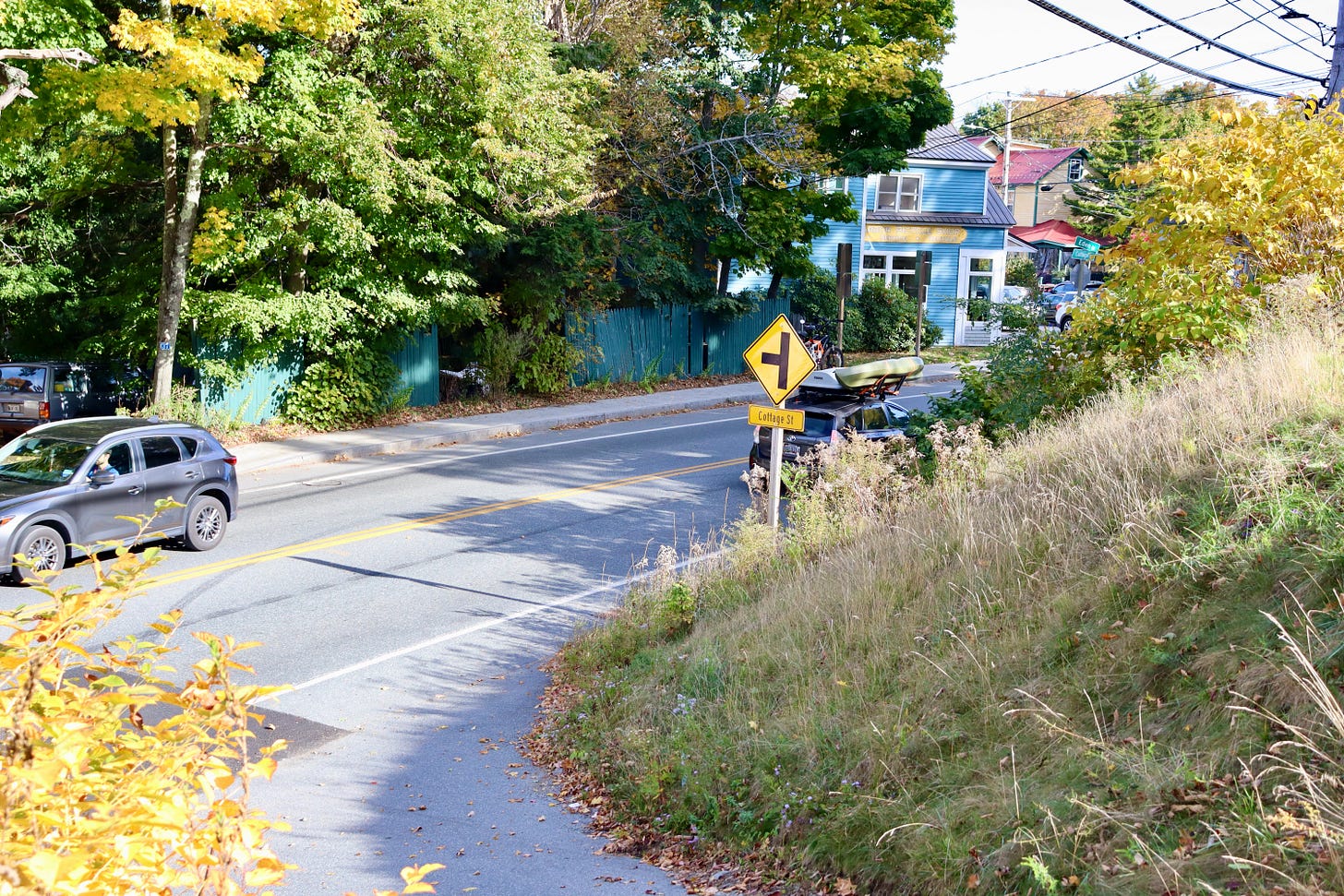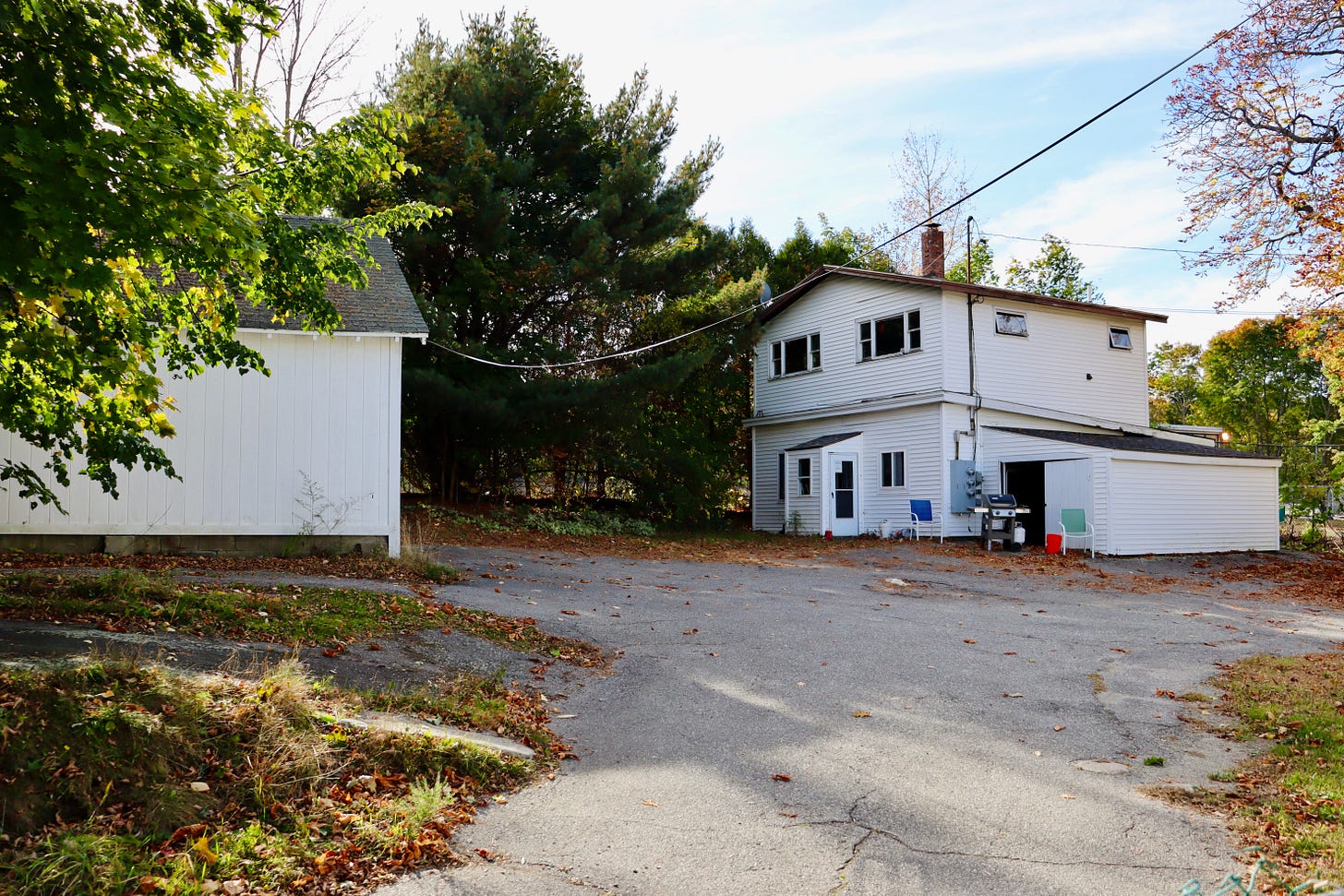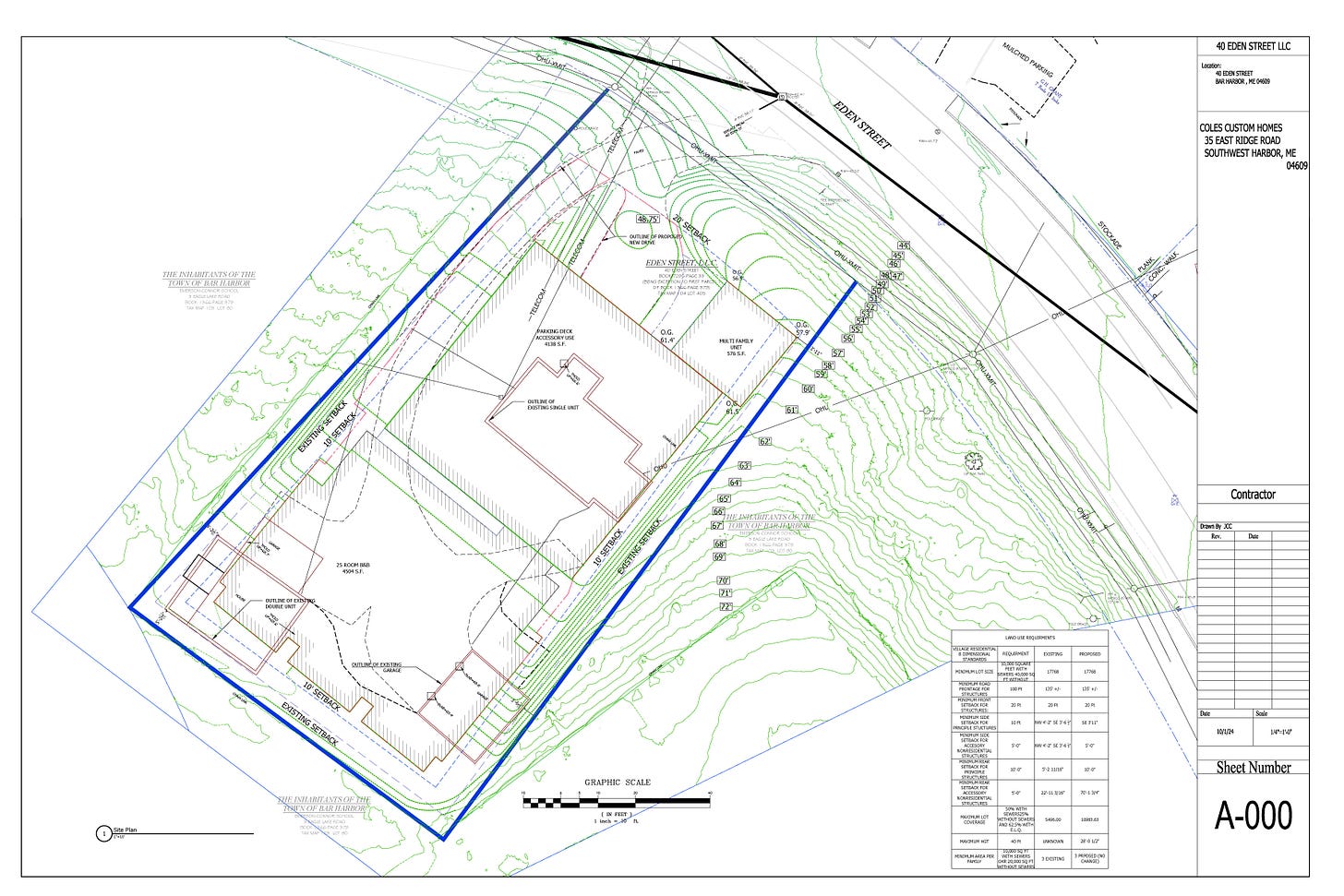New Lodging Proposed Near the Corner of Eden Street and Cottage Street
Plan set to go before Planning Board in November
BAR HARBOR—Stephen Coston, who will be represented by Tom St.Germain at the Bar Harbor Planning Board, has taken out an application for the Inn at Eden Street, which would be located at 40 Eden Street for a multi-storied 25-room inn on a small parcel of land that directly abuts the Conners-Emerson School.
Access to the site comes from an existing drive. According to a report by Sewall, a firm out of Portland, the site will still be accessed via that drive. The drive empties onto Eden Street right by the Cottage Street intersection.
The proposed project was initially reported on by Lincoln Millstein of the Quietside Journal. The application is scheduled to go before the Bar Harbor Planning Board at its November 27 meeting.
“The architectural plans for 40 Eden Street are for a 25-unit bed and breakfast use as well as on-site housing and parking,” Coston told the Bar Harbor Story, Friday. “The project has been designed to meet either of the two sets of regulations that may exist following the impending ballot vote re: lodging uses. The plans include housing for the business's employees as well as sufficient parking for guests and staff/residents. The on-site housing will be provided to our staff members free of cost as is all our company's employee housing. This project requires Planning Board approval because it is not in one of the districts that currently allows this type of use to be permitted via Code Enforcement. Currently, there are zero modifications of standards being sought RE (for) this project, making it unusually straightforward compared to most applications the Planning Board deals with. Additionally, these plans depict a project about 10% the scale/scope of the $60+ million Conners Emerson project taking place next door, which is funded by taxpayers and was not required to undergo any Planning Board review. For these and other reasons, this application is what I call a ‘nothingburger.’”
The project is expected to generate 200 one-way trips (100 roundtrips) daily. Under Bar Harbor ordinance, this is enough to trigger a traffic impact analysis.
The report from Sewall states, “The inn will generate from 13 to 18 one-way trips in peak hours. These trip levels would not be expected to have any significant impact off-site on traffic operations. Typically, there is no significant traffic operational impact unless a project generates more than 25 lane-hour trips. The maximum number of new lane-hour trips generated by the inn will be six (arrivals during the peak hour).”
The report also states that the size of the project does not require a MaineDOT traffic movement permit. It will require modification at the entrance to meet sight distance standards.
It also states that MaineDOT shows that “traffic volumes have grown on Eden Street at an average annual rate of less than 0.75%.”
An accident analysis shows that there is one high-crash location on Eden Street at its intersection with Cottage. The report recommends the town add signs to increase visibility and alert motorists.
“There were two crashes in 2021, three in 2022, and four in 2023,” the report reads. One was a rear-end collision and multiple angle crashes turning onto or off of Cottage Street. One third of the nine crashes that occurred at the site during those years involved bicyclists.
In 2022 during August, the state agency performed a count of turning movement at the intersection of Eden Street and West Street and West Street and West Street extension.
Coston’s company, Stay Bar Harbor, currently operates 395 rooms, all in Bar Harbor with the exception of one property, Cedar Crest Inn, in Camden.
“Cedar Crest has 37 rooms,” he said. “We expect The Pathmaker Hotel to open soon, however, I have not included it in the current room count. Pathmaker will offer 46 rooms.”
The Pathmaker Hotel is on Cottage Street and caused controversy because it was approved under the town’s definition of a bed and breakfast, but is large and feels more like what a hotel might be. St.Germain is also a partner in that project.
Coston is also part of Coston, McIsaac & Shea, whose assets under management are at approximately $400 million, built up from $60 million in 2015.
His application for the Inn at 40 Eden came to the town’s planning office on the same day as a League of Town’s meeting in Northeast Harbor where local officials from across the region spoke to lodging’s impact on traffic congestion and housing.
At that meeting, Bar Harbor Town Council Vice Chair Gary Friedmann said that the region has exceeded its carrying capacity as has Acadia National Park, as has Bar Harbor, as has the Route 3 corridor. The more the park accommodates increasing visitor capacity, he said, the more it impacts communities associated with it. Councilor Earl Brechlin also stressed that the area was maxed out with visitation and that it was impacting housing and traffic.
Acadia National Park Superintendent Kevin Schneider said that the lodging piece is crucial for an entire region. People have to have places to stay for overnight visits.
At the same time, talk about a potential lodging moratorium has resurfaced at the Bar Harbor Town Council.
The worry, however, is that lodging needs not being met in Bar Harbor could create ripple effects throughout the region, increasing pressure to turn properties in other towns into seasonal and short-term rentals, bed and breakfasts, rather than year-round homes. Then, traffic congestion could increase as people head from those other towns onto Mount Desert Island and into Acadia National Park.
Earlier this month, Bar Harbor Dentist Mathilde Resnick stood before the Town Council asking them to think again about a moratorium on lodgings (transient accommodations) in town. The request came after she said she’d been approached by a developer who wanted to buy her office building and residence on Main Street.
A potential moratorium on five types of transient accommodations in several zones in Bar Harbor failed to become a reality this April. It was also discussed late summer into fall 2023.
In September 2023, the town’s attorney Steven Wagner explained that a moratorium is “essentially a pause on development” and a pause on processing the applications for transient accommodations. To do that, the councilors would have to make certain findings: that the moratorium is necessary to stop a burden on public facilities and other aspects; that the existing comprehensive plan is inadequate. It was not passed or tabled, but sent to staff.
That potential moratorium had been initially suggested by Brechlin at an April 2 meeting after a citizen’s email suggesting a pause on bed and breakfasts that only require code enforcement officer approval rather than the town’s planning board approval.
The town is currently bringing the language of lodging categories (transient accommodations) before a vote in November. The definitions require changes to the town’s land use ordinance.
When people visit Bar Harbor and stay overnight, they stay in what the town calls transient accommodations (TA). Those include rooms in hotels and motels and bed and breakfasts. They also include campsites and RV sites. Short-term rentals in houses are a different category than rooms rented in hotels, motels, and bed and breakfasts. Short-term rentals that are not owner-occupied are capped in Bar Harbor.
LINKS TO LEARN MORE
Architectural plans uploaded by the Quietside Journal
If you’d like to donate to help support us, you can, but no pressure! Just click here.
If you’d like to sponsor the Bar Harbor Story, you can! Learn more here.















Bar Harbor needs year round affordable residential housing priced to the wage scale of the full range of essential workers. Any permits for new hotel-type commercial enterprises must come with the requirement to build a number of affordable year round residential units equal to or exceeding the proposed commercial units. It must also come with the requirement to provide on-site housing for seasonal workers.
The poor-mouthing of rapacious real estate developers is unseemly, their projects are unsustainable.
I am surprised at the stance of Park Superintendent Schneider. The park is already past peak capacity and struggling to find solutions for excessive tourism. Schneider doesn't seem to have considered that more hotel rooms will exacerbate the problems the park administration has yet to solve.
I lived at that location for a year and a half. The driveway is not only dangerous, but treacherous. It would be interesting to hear more about how they are going to redesign the driveway to meet sight requirements.